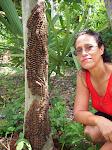By RONALD BLUM, AP Sports Writer Ronald Blum, Ap Sports Writer – 2 hrs 40 mins ago
RUSTENBURG, South Africa – Grim-faced American players filed by one by one on their way out of Royal Bafokeng Stadium. Their World Cup was over.
They'll have four long years to dwell on what might have been, how the most-talented team in U.S. soccer history was knocked out in a game the Americans were convinced they should have won.
No nail-biting comeback this time. The U.S. relied on late rallies once too often.
Life on the World Cup edge came to an exhausting and crushing end against a familiar foe Saturday night, when Ghana — led by Asamoah Gyan's goal 3 minutes into overtime — posted a 2-1 victory that ended a thrilling yet futile tournament for the United States in the second round just when it seemed the Americans had a relatively easy path to the semifinals.
"We felt like we had a great opportunity," goalkeeper Tim Howard said. "We just gave ourselves too much of a mountain to climb. We just couldn't come back."
Kevin-Prince Boateng put Ghana ahead when he stripped the ball from Ricardo Clark in the fifth minute and beat Howard from 16 yards. It was the third time in four games the U.S. fell behind early, and once again the Americans rallied.
Landon Donovan tied the score with a penalty kick in the 62nd minute, his record fifth goal for the U.S. in World Cup play, after Jonathan Mensah pulled down Clint Dempsey streaking in. But that was it.
There was no offense left, no spark, no fire — unlike the first-round come-from-behind draws against England and Slovenia, and Donovan's memorable injury-time goal against Algeria that lifted the U.S. into the knockout phase.
"We tried to push and push," U.S. captain Carlos Bocanegra said. "I don't know if we just didn't have anything left because we had been pushing so much the entire tournament."
Ghana, the only African team to advance past the first round of Africa's first World Cup, eliminated the Americans for the second straight World Cup following a 2-1 win that knocked out the U.S. in the group phase in Germany. The Black Stars joined Cameroon (1990) and Senegal (2002) as the only African teams to reach the quarterfinals and will play Uruguay for a berth in the semifinals, a round the U.S. has not reached since the first World Cup in 1930.
"A stinging, tough defeat," said Bob Bradley, who faces an uncertain future as U.S. coach.
With former President Bill Clinton watching and Mick Jagger sitting next to him, the U.S. was done in by a porous defense and forwards who failed to score a single goal in four games.
"When you give up this many goals, you're not going to go very far," Bocanegra said.
All five U.S. goals in the tournament came from the team's midfield backbone: three by Donovan, one by Dempsey and one by Michael Bradley, the coach's son.
In the first-ever extra time World Cup game for the U.S., Gyan got the winning goal when he took a long ball from Andre Ayew over the defense and beat Bocanegra, his teammate on the French club Rennes. Gyan let the ball bounce, took a touch with his chest, and with Jay DeMerit vainly trying to catch up, scored over goalkeeper Tim Howard with a left-footed shot from 16 yards.
"I had my angles right there. There no question about it," Howard said. "He absolutely crushed it."
The goal set off horn-honking celebrations in Ghana, a West African country nearly 3,000 miles away.
"We've made everybody proud," Gyan said. "Not Ghana alone, but all of Africa."
There was nothing to equal Donovan's injury-time goal that provided a 1-0 victory over Algeria and moved the Americans into the second round. The closest the U.S. came to tying it again was in the 98th minute, when Maurice Edu's header off Donovan's corner kick went wide.
With Howard pushed up, DeMerit's desperation long shot in the final minutes went over the crossbar. Then Dempsey sent a header wide.
At the final whistle, Howard consoled Bocanegra and Edu collapsed to the ground. Donovan exchanged jerseys with a Ghana player and walked off the field, put on a coat, sat on the bench and hung his head.
"If we're a little less naive tonight, we would have advanced," said Donovan, at 28 in his prime and the best American player ever. "I said all along this was a young team and a relatively inexperienced team at this level."
After Donovan tied the score with his American record 45th international goal, Jozy Altidore had the best opportunity. But he went wide in the 81st minute.
No American forward has scored in the World Cup since Brian McBride in 2002.
"Let's face it, you count on your forwards," Bradley said. "We need to get better at forward."
While the U.S. came from behind to draw England 1-1 and Slovenia 2-2 in the first round, the Americans looked ragged this time. They go home pondering a World Cup that could have been so much more. They thrilled the large number of Americans who were the largest group of overseas ticket buyers, but failed to do as well as the 2002 team, which reached the quarterfinals in the best U.S. finish since 1930.
An upset of European champion Spain in the semifinals of last year's Confederations Cup in South Africa had raised expectations.
"We always understand the responsibility we have as a national team to show how far the game has come in the United States, to fight for respect," Bradley said. "We certainly felt we moved things along with our performance in the Confederations Cup and as we went through the first round we felt that we were continuing to go in that direction."
Because a growing fan base watched on television in record numbers, the loss was even more painful for a team still struggling for recognition both in the soccer world and among sports fans in America.
"Soccer can be a cruel game," Donovan said. "Sometimes you're at the top and sometimes you are at the bottom of the mountain."
Ghana's only two goals in the first round had been penalty kicks by Gyan, but Boateng, whose half-brother plays for Germany, quickly put the Black Stars ahead from the run of play. After stealing the ball from Clark at midfield, he sprinted in on DeMerit, cut to the outside and turned the defender around as Clark chased in vain.
Clark, who hadn't played since the opener against England, was given a yellow card and was replaced by Edu in the 31st minute.
"He felt badly about the ball he lost. And I simply said, `That's part of soccer,'" Bob Bradley recalled.
Benny Feilhaber replaced speedy but ineffective forward Robbie Findley at the start of the second half, with Dempsey moving up. Feilhaber immediately had a chance when Altidore tipped the ball to him, but a sliding goalkeeper Richard Kingson, who also foiled the U.S. four years ago, got a hand on it.
On his penalty kick, Donovan kneeled behind the ball in concentration, then clanked it in off the far post. With his third goal of the tournament, he surpassed Bert Patenaude (1930) as the American career World Cup leader.
"I thought we had a good grip," Michael Bradley said "We were pushing the tempo. We were the ones getting chances."
Herculez Gomez came in for Altidore at the start of extra time. But nothing worked. The supporters in red, white and blue wigs and Uncle Sam hats were as deflated as the players.
"It's a feeling of disappointment for the team," Bob Bradley said, "and also all our fans."
Saturday, June 26, 2010
USA LOOSES MTO GHANA
Sunday, June 20, 2010
THE FABLE OF THE PORCUPINE/ LA FABULA DEL PUERCO-ESPIN IN ENGLISH y EN ESPAÑOL


ENGLISH
During the ice age, many animals died because of cold.
The porcupines, sensing the situation, decided to get together in groups, so they cherished and protected each other, however, the spines of each wounded their comrades, offering more than just the heat.
So they decided to move away from each other and started again to freeze to death.
Then they realized they need to make a choice: they would either accept disappearing from the Earth or tolerate the spines of their comrades.
With wisdom, they decided to be together.
And learned to live with the small wounds that being close would cause, because the most important thing was the heat received from each other. And thus they survived.
Moral
The best relationship is not perfect. Everyone needs to learn to live with the shortcomings of others, and to admire other people´s qualities.
SPANISH
La fábula del Puerco-espín.
Durante la era glacial, muchos animales morían por causa del frío.
Los puerco-espines, percibiendo la situación, resolvieron juntarse en grupos, así se abrigaban y se protegían mutuamente, más las espinas de cada uno herían a los compañeros más próximos, justamente los que ofrecían más calor.
Por eso decidieron alejarse unos de otros y comenzaron de nuevo a morir congelados.
Entonces precisaron hacer una elección: o desaparecían de la Tierra o aceptaban las espinas de los compañeros.
Con sabiduría, decidieron volver a estar juntos.
Aprendieron así a convivir con las pequeñas heridas que la relación con un semejante muy próximo puede causar, ya que lo más importante era el calor del otro.
Y así sobrevivieron.
Moraleja
La mejor relación no es aquella que une personas perfectas, más aquella donde cada uno aprende a convivir con los defectos del otro, y admirar sus cualidades.
Wednesday, June 16, 2010
CONGRATULATIONS
IT WAS GRADUATION TIME IN COROZAL LAST SUNDAY AND A NUMBER OF THE YO PUEDE GROUP GRADUATED FROM CJC WITH THEIR ASSOCIATES DEGREE.
IT WAS INDEED A TIME OF HAPPINESS FOR THOSE WHO WERE ABLE TO GO THE EXTRA MILE AND CLAIM THE REWARD OF THEIR LONG DAYS AND NIGHTS OF STUDYING.
BEST OF LUCK TO YOU AS YOU MOVE INTO A NEW LEVEL IN THIS ON GOING LEVEL CLIMBER CALLED LIFE.
GOOD LUCK AND REMEMBER JUST SAY YO PUEDO!!
IT WAS INDEED A TIME OF HAPPINESS FOR THOSE WHO WERE ABLE TO GO THE EXTRA MILE AND CLAIM THE REWARD OF THEIR LONG DAYS AND NIGHTS OF STUDYING.
BEST OF LUCK TO YOU AS YOU MOVE INTO A NEW LEVEL IN THIS ON GOING LEVEL CLIMBER CALLED LIFE.
GOOD LUCK AND REMEMBER JUST SAY YO PUEDO!!
Subscribe to:
Comments (Atom)








